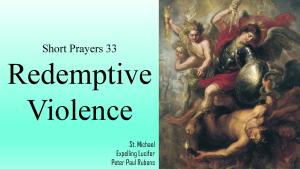And war broke out in heaven; Michael and his angels fought against the dragon. The dragon and his angels fought back, but they were defeated, and there was no longer any place for them in heaven. The great dragon was thrown down, that ancient serpent, who is called the Devil and Satan, the deceiver of the whole world—he was thrown down to the earth, and his angels were thrown down with him. (Revelation 12:7-9)

The Ancient Myth of Redemptive Violence
The ancient myth of redemptive violence is still with us. According to the myth repeated in culture after culture, a dragon threatens. The hero goes out to meet the dragon in mortal combat. War ensues. The valiant hero slays the dragon. Then, justice, peace and order reign over the land.
In ancient Babylonia, Marduk is the hero who defeats the dragon, Tiamat. In ancient India, Rama defeats Hanuman and rescues his kidnapped wife, Sita. In the Superman series, Clark Kent only needs a change of clothing before combat with one force of evil after the next to rescue the American city, Metropolis. With a license to kill, James Bond clashes with a series of global conspiracies to save democracy. According to the myth of redemptive violence, violence brings justice, peace, and order.
The myth of redemptive violence is what undergirds domination systems, according to New Testament scholar Walter Wink.
The Modern Myth of Redemptive Violence
The myth of redemptive violence provides the dominant interpretation of World War II. The dragon took the form of the Axis Powers comprised of Imperial Japan, Nazi Germany, and fascist Italy. After the near defeat of Britain, France, and Russia, the United States rose up to engage the dragon in both the Pacific and European theaters. America and its allies won the bloodiest war in human history. After the defeat of avowedly evil armies, in the post-war period America invested talent and dollars for the reconstruction of Japan and Germany. To all observers, the violent defeat of the Axis Powers led to justice, peace, and a new world order.
But, we ask: is it generally the case that violence leads to the destruction of evil? Or, is it more likely that violence is as corrupting to the victor as the loser?
The Arrogance of Power
Certainly, America corrupted itself and then deluded itself with this myth. After the generation who had fought World War II passed the torch of leadership, the United States has arrogantly flaunted its power in losing one war after the other, leaving only debris and devastation behind. In Vietnam, despite dropping napalm on villages and losing fifty-thousand soldiers, the Communists won. When the United States walked away from Iraq, only the debris of demolished cities remained, and 150,000 Iraqi people had come to a violent death. After two decades of warfare in Afghanistan, the Taliban succeeded in keeping a hard-fisted rule over their own country. World War II, three quarters of a century ago, marked the last moment when America could rightfully claim the role of hero.
Now, I firmly believe that the virtuous person must be ready to take up arms to fight against tyranny. And I believe that violence may, in some cases, be the only way to rid the world of tyranny. I affirm just way theory. Yet, we need ever to be on guard against the corruption of the victor. Otherwise, both victor and loser lose.
What Would Jesus Do?
 If anything, Jesus disavowed the myth of redemptive violence.
If anything, Jesus disavowed the myth of redemptive violence.
38 ‘You have heard that it was said, “An eye for an eye and a tooth for a tooth.” 39But I say to you, Do not resist an evildoer. But if anyone strikes you on the right cheek, turn the other also; 40and if anyone wants to sue you and take your coat, give your cloak as well; 41and if anyone forces you to go one mile, go also the second mile. 42Give to everyone who begs from you, and do not refuse anyone who wants to borrow from you.
43 ‘You have heard that it was said, “You shall love your neighbour and hate your enemy.” 44But I say to you, Love your enemies and pray for those who persecute you, 45so that you may be children of your Father in heaven; for he makes his sun rise on the evil and on the good, and sends rain on the righteous and on the unrighteous. 46For if you love those who love you, what reward do you have? Do not even the tax-collectors do the same? 47And if you greet only your brothers and sisters, what more are you doing than others? Do not even the Gentiles do the same? 48Be perfect, therefore, as your heavenly Father is perfect. (Matthew 5:38-48)
Just how is our heavenly Father perfect? On the cross, God’s Son did not retaliate against the Jews and Romans who caused Jesus’ suffering and death. God became the victim of violence, not the perpetrator.
Demythologizing the Myth of Redemptive Violence
God’s non-violent means of redemption on the cross invalidates the myth of redemptive violence. Redemptive violence is ineffective with God.
We need to demythologize that myth. By ‘demythologize’ I mean interpret the myth so we can clearly see the flaw, namely, victors are subject to corruption just as losers are subject to defeat.
Now, the atoning work of God in Jesus Christ involves violence, to be sure. But, redemption is afforded us by the loser, not the victor. Or, more ironically, the loser turns out to be the victor in God’s calculus.
Curiously, even the Bible cannot resist appealing to the myth of redemptive violence to symbolize God’s victory in the cross. That’s what the story of St. Michael and All angels does. Revelation 12 retells the story of Christ’s atonement using mythical tropes. Michael, actually Jesus Christ, defeats Satan in a mortal battle. Same story as the cross. Different imagery.
Finally, final redemption can define our life only after the violence has ended. When Jesus asks us to turn the other cheek, he’s asking us to forsake the myth of redemptive violence in order to be perfect in the way God is perfect.
PRAYER
Holy Spirit, open our critical eyes to see the flaw in the myth of redemptive violence. Help us us to become perfect in the way our heavenly Father is perfect. Amen.
▓
Ted Peters is a Lutheran pastor and emeritus seminary professor. He is author of Short Prayers and The Cosmic Self. His one volume systematic theology is now in its 3rd edition, God—The World’s Future (Fortress 2015). He has undertaken a thorough examination of the sin-and-grace dialectic in two works, Sin: Radical Evil in Soul and Society (Eerdmans 1994) and Sin Boldly! (Fortress 2015). Watch for his forthcoming, The Voice of Public Christian Theology (ATF 2022). See his website: TedsTimelyTake.com.
▓













